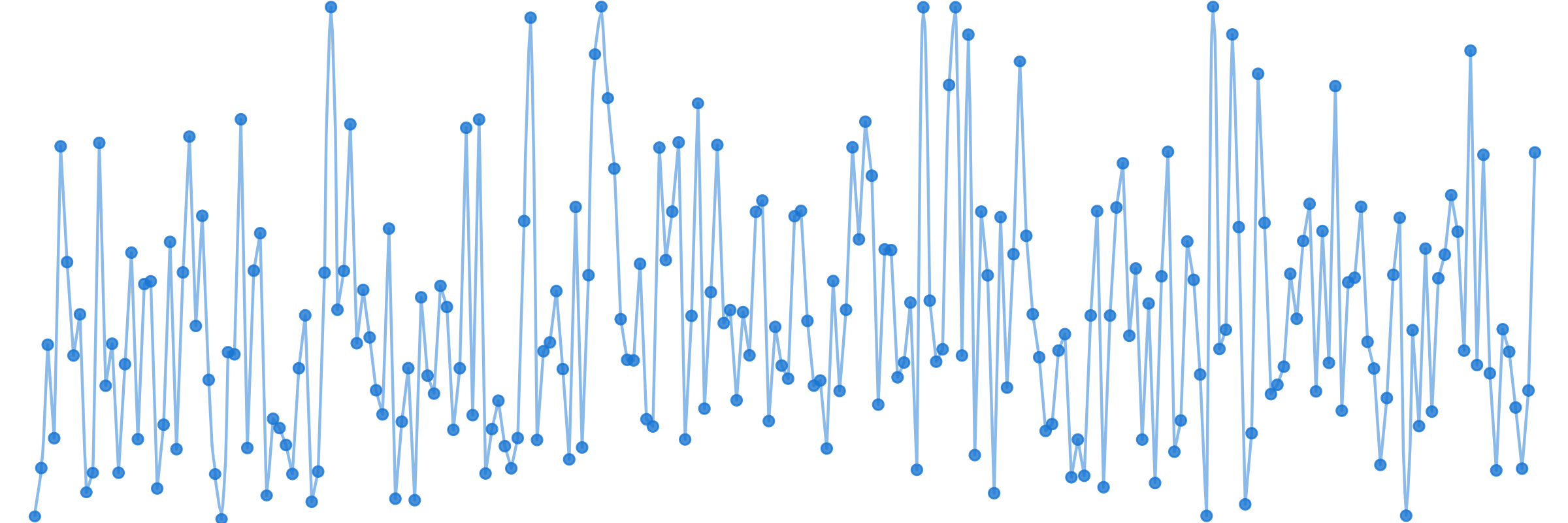Cognitive fluctuations
- 3 minsHow a variability perspective can offer a novel phenotype

We set out to answer a few fundamental questions on variability:
-
Ubiquity: do we find cognitive variability in each task?
-
Structure: how are individual differences in variability across tasks related?
-
Discrimination: is variability a distinct concept from mean performance?
For an in-depth look check out the preprint or OSF for code! If you have any further questions just reach out and ask me :)
Now Published
Talk
Abstract
Our performance on cognitive tasks fluctuates: the same individual completing the same task will differ in their response’s moment-to-moment. For decades cognitive fluctuations have been implicitly ignored – treated as measurement error – with a focus instead on aggregates such as mean performance. Leveraging dense trial-by-trial data and novel time-series methods we explored variability as an intrinsically important phenotype. Across eleven cognitive tasks with over 7 million trials, we found highly reliable interindividual differences in cognitive variability in every task we examined. These differences are both qualitatively and quantitatively distinct from mean performance. Moreover, we found that a single dimension for variability across tasks was inadequate, demonstrating that previously posited global mechanisms for cognitive variability are at least partially incomplete. Our findings indicate that variability is a fundamental part of the human phenotype, with the potential to offer rich, novel insights into cognitive performance.
Key Literature
Conceptual
- Nesselroade, J. R. (1991). The Warp and the Woof of the Developmental Fabric. 19.
- Siegler, R. (2007). Cognitive variability. Developmental Science.
- Siegler, R. (1994). Cognitive variability: A key to understanding cognitive development. Current Directions in Psychological Science.
- Dhawale, A. K., Smith, M. A., & Ölveczky, B. P. (2017). The Role of Variability in Motor Learning. Annual Review of Neuroscience, 40, 479–498.
Neurodevelopmental
- Kofler, M. J., Rapport, M. D., Sarver, D. E., Raiker, J. S., Orban, S. A., Friedman, L. M., & Kolomeyer, E. G. (2013). Reaction time variability in ADHD: a meta-analytic review of 319 studies. Clinical Psychology Review, 33(6), 795–811.
- Karalunas, S. L., Geurts, H. M., Konrad, K., Bender, S., & Nigg, J. T. (2014). Annual research review: Reaction time variability in ADHD and autism spectrum disorders: measurement and mechanisms of a proposed trans-diagnostic phenotype. Journal of Child Psychology and Psychiatry, and Allied Disciplines, 55(6), 685–710.
- Aristodemou, M., Rommelse, N., & Kievit, R. (2023). Attentiveness modulates reaction-time variability: findings from a population-based sample of 1032 children. Psyarxiv
Sample & DSEM
- Judd, N., & Klingberg, T. (2021). Training spatial cognition enhances mathematical learning in a randomized study of 17,000 children. Nature Human Behaviour, 5, 1548–1554.
- McNeish, D., & Hamaker, E. L. (2020). A primer on two-level dynamic structural equation models for intensive longitudinal data in Mplus. Psychological Methods, 25(5), 610–635.
- Hamaker, E. L., Asparouhov, T., Brose, A., Schmiedek, F., & Muthén, B. (2018). At the Frontiers of Modeling Intensive Longitudinal Data: Dynamic Structural Equation Models for the Affective Measurements from the COGITO Study. Multivariate Behavioral Research, 53(6), 820–841.
Neural Variability
- MacDonald, S. W. S., Li, S.-C., & Bäckman, L. (2009). Neural underpinnings of within-person variability in cognitive functioning. Psychology and Aging, 24(4), 792–808.
- Waschke, L., Kloosterman, N. A., Obleser, J., & Garrett, D. D. (2021). Behavior needs neural variability. Neuron, 109(5), 751–766.